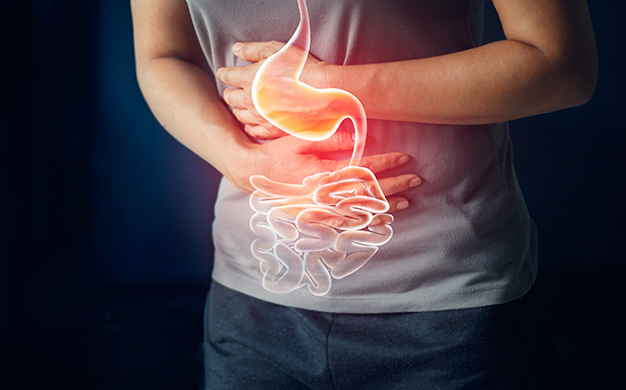Gastrointestinal diseases are illnesses linked to the digestive system. The symptoms are unpleasant, but most can be prevented or treated with the right methods.
Our digestive system, which extends from the mouth to the anus, receives food, breaking it down into nutrients (the process is known as digestion), absorbing the nutrients into the blood, and eliminating the waste (undigested food) from the body. The mouth, throat, oesophagus, stomach, intestine, rectum and anus is used in the digestive system. Diseases of the gastrointestinal system can be divided into two categories, namely:
- Upper gastrointestinal disorder -These involve diseases of the oral cavity, oesophagus and the stomach
- Intestinal disorders include small and large intestine disorders, including small and large intestine, rectum, and the anus.
The small intestine conditions are enteritis, peptic ulcer, and malabsorption. Those affecting the large intestine include colitis, appendicitis, irritable bowel syndrome, diverticular disease, and megacolon. Conditions that affect both small and large intestines are enterocolitis and Crohn’s disease. One can easily buy gastro health medicine online in US at the best price.
About gastrointestinal disease
There are two types of gastrointestinal disease, namely functional and structural. Examples include nausea, vomiting, diarrhoea, lactose intolerance, and food poisoning.
- Functional gastrointestinal diseases:
Functional diseases associated with the gastrointestinal tract (GI) are the most common problems. These include constipation, irritable bowel syndrome, bloating, food poisoning, nausea, GERD, and diarrhoea. A lot of factors may be responsible for an upset GI and its motility, and these include:
- Eating a low fibre diet
- Not getting enough exercise
- Travelling or other changes in the daily routine
- Stress
- Eating large amounts of dairy products
- Ignoring a bowel movement, possibly because of haemorrhoids (swollen veins in the anus)
- Using antacids that contain aluminium or calcium
- Taking antidepressants, iron pills, and strong pain medicines
- Pregnancy
- Structural gastrointestinal diseases
These diseases are those where your bowel looks abnormal and doesn’t function properly. In some cases, the structural abnormality needs to be removed. Common structural diseases of GI are stenosis, haemorrhoids, colon polyp’s colon cancer, diverticular disease, strictures, and inflammatory bowel disease.
Other Gastric Issues:
Constipation
Constipation makes it hard to have a bowel movement. Constipation is often the result of inactivity, eating or consuming many dairy products, not having enough fibre or water in your diet. The condition may resolve within a few days. Symptoms include bloating infrequent bowel movements. Constipation may cause small hard stools and problems such as fissures and haemorrhoids. It rarely leads to a more serious medical condition. You can treat constipation by:
- Increasing fibre intake
- Exercising regularly
- drinking plenty of fluids
- Not ignoring bowels when you have the urge
Add laxatives to your routine if these methods don’t work for you. Follow your doctor’s instructions on the laxative medicine. Buy gastrointestinal disease treatment online as the medicines are available online with the best discounts.
Irritable bowel syndrome
Irritable bowel syndrome occurs when your colon muscle contracts more or less than normal. Certain foods, medicines, and even stress can trigger irritable bowel syndrome. Symptoms include bloating, abdominal pain/cramps, constipation/diarrhoea, excess gas, and change in bowel habits (loss of hard stools).
Treat irritable bowel syndrome by:
- Increasing fibre in the diet
- Avoiding excessive caffeine
- Monitoring foods that trigger the condition
- Learning stress management strategies
- Getting enough sleep
- Avoiding dehydration
Haemorrhoids
Haemorrhoids are swollen veins in the anal canal, structural disease. The condition is caused by chronic excessive pressure from straining during a bowel movement, diarrhoea, or pregnancy. Haemorrhoids are of two types:
Internal: These are blood vessels present inside your anal opening. When they fall into the anus due to straining, they bleed.
Treatment
- Improving bowel habits
- Your doctor may use ligating bands to eliminate the vessels
- Surgery is done for large painful, and persistent haemorrhoids
External: These are veins that lie under the skin outside the anus. In some cases, after straining, these veins burst, thus creating blood clots under the skin. This is a very painful condition and is often referred to as a pile. The condition can be treated by removing the clot and vein under local anaesthesia or removing the haemorrhoid itself.
Colitis
Colitis is a condition that causes inflammation of the bowel. There are several types of colitis, including:
- Ulcerative colitis
- infectious colitis
- Crohn’s disease
- Radiation colitis (after radiotherapy)
- Ischemic colitis (caused when there is not enough blood in the colon)
Colitis leads to diarrhoea, abdominal cramps, rectal bleeding, and an urge to empty the bowel.
Many diseases of GI can be prevented by maintaining a healthy lifestyle and practising good bowel habits. In some cases, screening for cancer is required.
Conclusion
There are many other gastrointestinal diseases. For more information, discuss with your doctor. But it is always important to see a doctor for any persisting or alarming diagnosis symptoms or a treatment plan. Experience the comfort of an online pharmacy and buy gastro health drugs online.




